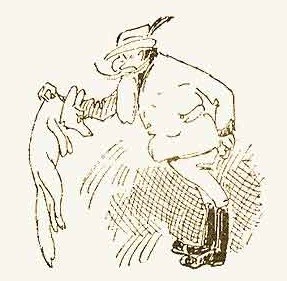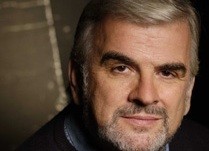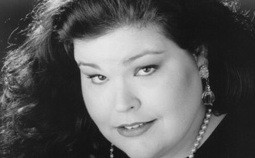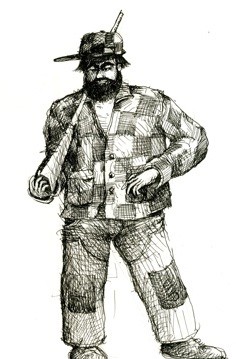The New York Philharmonic Janacek's Cunning Little Vixen
Alan Opie Shines in the Doug Fitch Production
By: Susan Hall - Jun 24, 2011
New York Philharmonic
The Cunning Little Vixen by Leos Janacek
June 22, 2011
Alan Gilbert, Conductor
Doug Fitch, Director and Designer
Edouard Getaz, Producer
A production created by Giants Are Small
G.W. Mercier and Doug Fitch, Scenic Designer
Clifton Taylor, Lighting Designer
Doug Fitch, Costume Designer
Karole Armitage, Choreographer
Cookie Jordan, Make-up and Hair
CAST:
Alan Opie as Forester
Melissa Parks as Forester's Wife/Owl
Keith Jameson as Schoolmaster/Mosquito
Wilbur Pauley as Badger/Parson
Joshua Bloom as Harašta, a poultry dealer
Isabel Bayrakdarian as Vixen
Marie Lenormand as Fox
Serena Benedetti as Frantík, Pepík's friend
Kelley O'Conner as Lapák, a dog
Emalie Savoy as Cock/Jay
Devon Guthrie as Chocholka, a hen
Lacey Benter as Woodpecker
New York Choral Artists, Joseph Flummerfelt, Director
Metropolitan Opera Children's Chorus, Anthony Piccolo, Director
New York Philharmonic, in an adventuresome extension of a symphony’s mission, has taken on the semi-staged and staged production of operas. Last year’s Grand Macabre was a high-risk triumph for the new music director Alan Gilbert.
How tempting The Cunning Little Vixen is to produce. The story, developed from a cartoon in a daily paper for which the composer Leos Janacek wrote, is the sad and yet rhapsodic tale of how we creatures, animal and human, mirror nature in our natures. Attractions go awry and bind; men are both vicious and kind. Through it all we procreate and go on. So far, at least.
Gilbert and the orchestra took full advantage of every musical opportunity provided by a gorgeous score. Strings and horns were particularly striking as they evoked the magical combination of the yearning, sadness and joy that is Cunning Vixen.
Delightful folk tunes from Moravia are woven throughout the score, as Dvorak, a hero of Janacek’s, used the American vernacular in New World Symphony. Janacek composed the music of language, human and animal. Also in Vixen, the forest inspires as the Volga did in Janacek’s Jenufa.
Mahler had let nature loose in the music he composed while sitting in his small cottage in Maiernigg. We have no record of Mahler out in the wilds taking notes on animal and bird sounds. There is a wonderful picture of Janacek by the sea in Holland noting down the sounds of the tide.
When Janacek finally could afford to buy a home in the woods in Luhacovice, the village where he grew up and first fell in love with nature, he must have heard these sounds as he took his walks through the woods. Who knew a vixen and a fox made so many different sounds? How contemporary the idea to make music of them. Or for that matter Sprechstimme, which Janacek called the melody of speech.
The translation to English in the Philharmonic production served the music well, although some of the singers had trouble clearly articulating phrases. English subtitles were in any case provided on a sky blue scrim that dropped down stage front.
Alan Opie, a charismatic actor with a strong and vibrant baritone and expressive diction, took over the stage as the forester. Opie looks like Janacek’s taller brother. Opie's lovely baritone voice captured the inspiration of the forest and its dwellers who cavorted about the stage with glee, even when they are threatened with extinction by gun.
The orchestra was bathed in either the green light of growth or the warm yellow of sunshine. Splendid sunflowers hovered over percussion and brass. Gilbert brought out the composer's infinite variety with passion and precision.
Too much may have been going on in an opera that already operates on many levels, musically and in its ideas. I like my music straight up, but understand the pressure on all symphony orchestras to attract new audiences. Clearly multi-media productions are a flavor de jeur. If gorgeous and funny costumes draw people in to hear Janacek, it is well worth whatever problems it creates for the performance purist.
Still this is not a ‘fully-staged’ production, its elements less sophisticated than last year’s ‘semi-staged’ Grand Macabre. Somehow less was more in the Ligeti and also more satisfying. Then the through line of the story is simpler in Grand Macabre.
This production ended up distracting from the orchestra’s central role. When Opie and Melissa Parks, whose lush mezzo voice suited the role of both the forester’s wife and an owl, take over we are completely rapt. The flock of chickens and a lead of foxes are not quite stylized enough to sell their presence. A BBC presentation of the opera with full animation is more successful, even though the animation was more cute than cutting edge. In its pared down production, the Long Beach Opera also had the orchestra on stage, but hidden by a scrim. Sung by the exciting young soprano Ani Maldjian, this small production won the hearts of even the toughest critics.
So many ideas, musical and otherwise: characters who are both human and animal and animal and human, the central animals, fox and vixen, suddenly human when they experience sexual attraction. Confusion almost overwhelms the story and music at Avery Fisher Hall.
The consummate performance by the Philharmonic, the pleasure of hearing and watching Alan Opie and the many treasures directed and produced by Doug Fitch, not the least of which is an exponentially delightful vixen tail, are worth the endeavor. The Janacek score has never sounded better.






